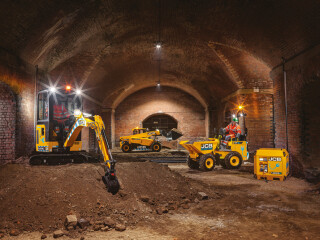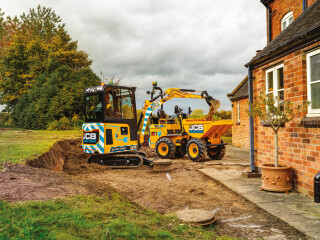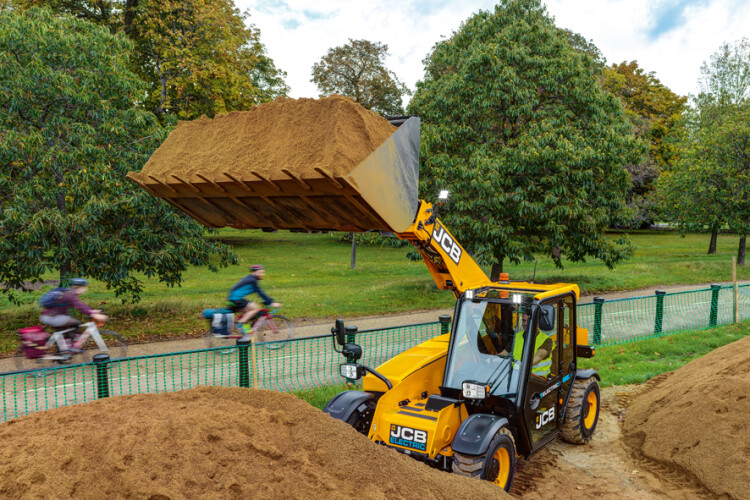Marketing and publicity play an important role in any manufacturer’s business, and many are willing to spend large amounts to fly the flag and draw potential customers in.
JCB has never been one to scrimp when it comes to publicity and every year the company invites trade journalists from all over the world to its headquarters in Rocester, Staffordshire, to unveil the year’s new product developments. The press corps’ all-expenses-paid trip involves a formal dinner, hotel accommodation and a showbiz-style presentation at JCB’s fully-equipped, purpose-built theatre – followed by an afternoon of live demonstrations at the company’s nearby proving ground.
This year, however, Covid-19 restrictions meant that JCB was obliged to curtail its largesse. Scheduled for mid-November (bang in the middle of the UK’s second lockdown) the international press jamboree was replaced with a one-hour ‘virtual press conference’ conducted over the internet.
This article was first published in the Dec/Jan 2021 issue of The Construction Index magazine. Sign up online.
The adoption of a new technology that can save time, money and many carbon-miles was satisfyingly appropriate to the theme of the event: alternative fuels and “the road to zero”.
By ‘zero’, JCB of course means zero carbon emissions. The press conference served to underline JCB’s commitment to the exploration of alternative fuels with the launch of two new all-electric machines and a universal fast-charger for its emerging battery-powered E-Tech range.
Throughout the event, the message “100% electric; zero emissions” was hammered home by each speaker.
The star of the show was JCB’s first fully-electric, battery-powered Loadall telehandler, the 525-60E.
A direct equivalent of the existing diesel-powered 525-60 model, the new version has two electric motors – one for driveline, the other for lifting operations – powered by a 96-volt lithium-ion battery.
The 17kW drive motor provides tractive force to the axles through a permanent four-wheel drive dropbox. The second, 22kW, motor powers the hydraulic system via a fixed-displacement gear pump, providing up to 80 litres/min of flow.
The hydraulic system is completely new and, unlike that of the diesel-powered 525-60, flow is proportional to the position of the joystick and not to engine, or motor, speed.
The hydraulic system also features ‘smart regeneration’ with power recovered during boom lowering and retraction fed back into the battery.
Similarly, the traction drive motor uses regenerative braking to top up the battery.
According to JCB’s chief innovation and growth officer, Tim Burnhope, the 525-60E has exactly the same performance characteristics as its diesel-powered predecessor, including a maximum lift capacity of 2,500kg and the ability to lift 2,000kg to the maximum 6m height.
The new machine offers “a zero emissions load-handling solution with no compromise in performance of productivity”, said Burnhope. Cycle times are similar to those of the diesel version but the new electric model is much quieter, he added.
Joining the new Loadall is JCB’s first all-electric site dumper, a one-tonne high-tip model designated the 1T-E. Described as the ideal partner for JCB’s 19C-1E electric mini-excavator, launched in 2018, this is essentially a battery-powered version of the diesel-powered 1T-2 model.

Power is supplied by two 5kWh lithium-ion batteries through a 7kW hydraulic motor. Instead of the individual hydrostatic wheel-motors of the 1T-2, the electric version uses conventional drive axles and a drop box to deliver full-time all-wheel drive.
A second hydraulic pump is used to power the machine’s standard hydraulic circuit for steering and skip-lift. The operator is protected with a standard roll-over protection (ROPS) frame and LED amber and green lap-belt beacons are fitted to ensure the operator is securely seated when working.
Again, performance and productivity are ‘identical’ to that of the diesel model, both in travel speed and tipping cycles. The maximum payload is 1,000kg and maximum load over height is 2,392mm.
JCB is at pains to stress that all the machines in the E-Tech range area capable of a full working shift on a single charge. All models in the E-Tech range are fitted with the same on-board charger, capable of recharging the battery in eight hours using a standard 240V, 16A supply.
.png)
This article was first published in the Dec/Jan 2021 issue of The Construction Index magazine. Sign up online.
To further reduce charging times, JCB has launched a new rapid universal charger, compatible with all existing and future E-Tech models with electrical systems from 48V to 96V.
Richard Brooks, engineering director for JCB’s materials-handling and access group, said the 525-60E Loadall can be fully charged from zero to 100% in less than two hours and the battery is good for approximately 5,000 charging cycles.
The universal charger requires a standard 415V three-phase electrical supply and comes with both four- and five-pin connectors to suit all site power supplies throughout Europe.
Along with the 19C-1E mini-excavator, a 500kg-capacity walk-behind dumpster launched in September, a small scissor-lift, factory forklift and power-pack, the E-Tech range now numbers seven machines. Burnhope says there’s “a lot more to come” and that customer response to the latest developments has been “incredible”.
The hire sector will be crucial to the take-up by end-users, observes Burnhope: “customers will want to ‘try before they buy’ and that gives rental firms another outlet,” he says.
While the focus of the launch was on electrically-powered machines, JCB also restated its intention to explore other alternatives to conventional fossil fuels.
In July, the company unveiled a prototype 20-tonne excavator, based on the existing 220X model, powered by a hydrogen fuel cell. “We’ve got to really experiment with alternative fuels, whether that’s clean-diesel, electric, hydrogen or ammonia,” says Burnhope.
Hydrogen in particular has great potential in the construction equipment sector, where machines frequently have to operate on sites that have no mains electricity – a problem for battery-powered equipment.
“Hydrogen can be delivered to site in bowsers, just like diesel,” says Burnhope, adding that JCB’s experiments with hydrogen fuel-cells have been driven personally by chairman Lord Bamford who is “fixated on zero-emissions”.
After the product presentations – which of course JCB could pre-record for convenience – there followed a live question-and-answer session, with questions submitted electronically via the clever e-conferencing software.
This had three major benefits. Firstly, there were far more questions submitted than would have been possible in a real live conference setting where questions would have to be taken one at a time. Here, everybody could zap off as many questions as they liked, whenever they liked.
Secondly, it afforded JCB’s team the luxury of choosing which questions to answer; it was clearly impossible for them to address every single one.
And thirdly, it avoided the common tendency of a few myopic gricers to dominate the Q&A with arcane questions about a machine’s technical specifications. Instead, the discussion could focus on issues more meaningful to potential users of the equipment.
The conference concluded with a few words from JCB CEO Graeme Macdonald to thank all the delegates and to offer his assessment of JCB’s prospects for the coming year. Despite the chaos of Covid-19, JCB has weathered the storm, he said, and “every market has rebounded”. Sales are picking up.
Macdonald even forecast growth for next year of between 5% and 8% and observed that many other nations, besides the UK, were using infrastructure to “build back” again.
And as for the ‘virtual’ press conference: a great success, declared Macdonald, with 250 delegates participating – roughly twice the number that would normally have attended in person.
So not only did JCB save a great deal of time, money and a lot of fossil-fuelled travel by air, rail and road, it also doubled the potential coverage that might accrue from the event.
This article was first published in the Dec/Jan 2021 issue of The Construction Index magazine. Sign up online.

Got a story? Email news@theconstructionindex.co.uk



